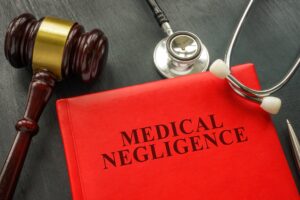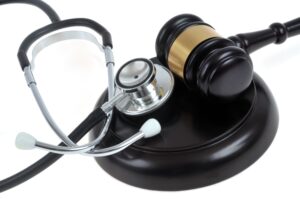What Could Be Classed As Medical Negligence In The UK?
By Lewis Aaliyah. Last Updated 26th Janaury 2024. Welcome to our guide on what is classed as medical negligence. Sometimes, complications can arise when you’re receiving medical treatment. These issues can happen even when a medical professional is adhering to the duty of care they owe to you; although unfortunate, these instances aren’t classed as negligence.
Sometimes, however, you may receive care that falls below the standard you expect. Furthermore, you may be made ill, injured, or have your condition worsen as a result of this substandard care. If this is the case, you may be able to claim compensation for medical negligence.
What could be classed as medical negligence in the UK guide
In the UK, all medical practitioners must be registered to ensure that they adhere to professional standards. Whether your operation was a necessary medical procedure or elective surgery based on cosmetic requirements, the duty of care that is applied is the same.
You have a right to expect the right level of treatment, care and professionalism. We will explain to you what your options are if you were failed in that expectation and what damages you could be awarded.
If you’re looking right now to commence a claim for an injury caused by medical negligence, get in touch by:
- Calling our team on 020 3870 4868
- Emailing us at UKlaw.co.uk
- Using the ‘live support’ option to the bottom right which offers on the spot guidance.
Services And Information
- What Is Classed As Medical Negligence?
- Compensation For Medical Negligence In The UK
- Medical Negligence Claims Examples
- Time Limits For Claims Classed As Medical Negligence
- I Was Harmed By Medical Negligence In The UK, What Should I Do?
- Medical Negligence Claims In The UK – No Win No Fee Legal Help
- Other Information
What Is Classed As Medical Negligence?
In order for the harm you suffered to be classed as medical negligence, it must meet certain criteria. You must have been owed a duty of care by a medical professional, and a breach of this must have caused you unnecessary harm. These factors combine to make medical negligence.
When you seek medical treatment, you are automatically owed a duty of care by the medical professionals involved in your care. This means that the treatment you are given should meet a minimum standard.
Various medical professionals may be involved with your treatment. Each one is expected to take different steps depending on the field they work in. For example, the General Medical Council (GMC) provides guidances for the standards doctors should meet in their Duties of a Doctor.
If you would like to discuss the medical error that caused you to suffer unnecessary harm, get in touch with a member of our advisory team today. They can offer more advice on making a medical negligence claim, and can evaluate your claim for free.
Compensation For Medical Negligence In The UK
Compensation for medical negligence in the UK can often fall under two heads of claim. They’re known as general damages and special damages. In this section, we’ll describe both of these payments in more detail.
General Damages
This amount is calculated and awarded based on how severe your injuries are, amongst other factors – they can be physical or even psychological. When legal professionals are working out how much general damages for medical negligence claims should be worth, they will address sources such as the medical evidence you present to support your claim. Additionally, they will also turn to the Judicial College Guidelines (JCG). This is a publication that was last updated in 2022. We’ve included some example entries in the table below. However, the top row is not from the JCG but included to show how you could be compensated for multiple very serious illnesses and any incurred costs. As you can see, each injury is assigned a range of figures that can be used to give a rough idea as to the value of a general damages claim for this ailment.
| Type of Harm | Severity | Information | Compensation Guidance |
|---|---|---|---|
| Multiple Very Severe Illnesses and Injuries Plus Expenses | Very Serious | Claimants could be compensated for more than one very serious illness or injury and their incurred costs such as lost wages. | Up to £1,000,000+ |
| Brain Damage | Very Severe | Symptoms related to very severe brain damage, such as a lack of meaningful environmental responses require full time nursing care. | £282,010 to £403,990 |
| Brain Damage | Moderate (i) | The claimant has no employment prospects as a result of a moderate to severe intellectual deficit, personality change, effect on senses and significant epilepsy risk. | £150,110 to £219,070 |
| Kidney | Serious | The claimant has suffered either serious permanent damage or the loss of both kidneys. | £169,400 to £210,400 |
| Bladder | Very Serious | This bracket applies when the harm results in the complete loss of control and functioning of their bladder. | Up to £140,660 |
| Lungs | Serious | The claimant is a young person with a serious disability and a probability of progressive worsening of the condition. | £100,670 to £135,920 |
| Amputations | Loss of One Arm (ii) | The injured party required an above-elbow amputation. | £109,650 to £130,930 |
| Female Reproduction | Permanent | The claimant suffers with permanent sexual dysfunction. However, they either already have children or wouldn’t have had them. | £43,010 to £102,100 |
| Male Reproduction | Impotence | The claimant suffers from permanent impotence or significant sexual dysfunction. However, they already have children or wouldn’t have had them. | £43,010 to £88,750 |
| Spleen | Loss | The loss of their spleen leaves the claimant with a continuing risk of internal infections. | £20,800 to £26,290 |
Special damages
This is a figure that you may also be eligible to receive. It can be made up of various costs and losses that you experience as a result of your injuries. For example:
- Loss of earnings – Your ability to work and earn a living may be impacted due to the impact on your health.
- Medical costs – Prescription medication, some private healthcare procedures etc.
- Other costs – For instance, you may be unable to go on a trip that has already been paid for, due to your injury
Get in touch with our advisors today if you want to know more about what could be included in a special damages payment, and what medical negligence claims in general could be worth. You can also head to the compensation calculator on our website.
Medical Negligence Claims Examples
If you can prove that a medical professional breached their duty of care to you and this resulted in you suffering unnecessary harm, you might be eligible to claim compensation.
Some examples of when you might be eligible to make a medical negligence claim include:
- Your GP prescribes you medication that contains something you were allergic to. They were aware of this allergy, as it was stated on your medical records. Due to this, you suffer an allergic reaction.
- Despite displaying clear symptoms of a fractured ankle, a doctor fails to order an X-ray and misdiagnosis your fracture as a sprain.
- Your breast cancer is misdiagnosed as a swollen lymph node. This could result in you receiving delayed treatment, and your cancer could spread.
- A patient receives vitrectomy surgery, a type of eye treatment that treats issues with the retina and vitreous. However, during the surgical procedure, the ophthalmologist slips and damages the eye with the instruments being used for the procedure. Such an error could lead the patient to suffer partial sight loss and severe scarring.
There are other ways that negligence in hospitals or a similar setting can occur.
Speak to our advisors today if you have any questions about medical negligence claims and for examples of the potential compensation that could be awarded for successful claims.
Missed Diagnosis And Misdiagnosis
A medical missed diagnosis can cause a patient’s condition to worsen. A missed diagnosis is where an ailment is not recognised and diagnosed. On the other hand, a misdiagnosis happens when an illness or injury is mistakenly diagnosed as something else.
Either of these could cause further complications with the patient’s health. A missed diagnosis could result in you not getting the treatment you need. A misdiagnosis could also mean that you get treatment you don’t need. In addition, if you are being treated for a condition you do not have then the medication could make you more ill.
Misdiagnosis and missed diagnosis can happen for a number of reasons. These include:
- The right diagnostic tests not being ordered because symptoms were not identified.
- The results of a test being interpreted incorrectly.
- An administrative error resulting in the results of a test being lost or misplaced.
Negligence During Surgery And Surgical Aftercare
There are a number of things that can go wrong in surgery that could cause you more pain and suffering than the condition you needed the operation for. Surgical errors that might occur include:
- Wrong-site surgery where an operation is performed on the wrong area of the body
- A foreign object being left in the body after an operation
- Anaesthesia issues
- Infection caused by poor hygiene standards during surgery
- Surgery being performed when it wasn’t necessary for the patient’s health.
Some of these instances, including wrong-site surgery and a foreign object being retained in the body, are classed as Never Events. These are serious incidents that are preventable and should not have happened if all healthcare providers followed the strict frameworks in place to prevent them from occurring.
Never Events are always examples of medical negligence. If you are unsure whether or not the treatment you received was substandard our medical negligence advisors will be able to assess your case for you in a free no-obligation chat. Call today for more information.
Negligence During Childbirth
Childbirth can be difficult to navigate under ideal circumstances. If a midwife or other healthcare provider providing you with care that fell below an acceptable standard, resulting in a birth injury, then you may be able to claim.
Examples of issues during childbirth might include:
- Failing to identify and treat an infection that could injure the unborn child, like a urinary tract infection
- Incorrect use of equipment such as forceps
- Failure to monitor the child or mother for problems in childbirth
- Injuries to the infant while being delivered or after birth. This could include nerve damage or paralysis caused by delivery. Injuries to an infant during childbirth can be fatal.
- Retained placenta which isn’t diagnosed or treated in time, leading to further complications
It is expected that mothers who have just given birth will experience some pain and discomfort in the process of labour and as they recover. But if the negligence of a healthcare provider has caused you or your child to suffer more than you otherwise would have, you may be able to claim. Speak with our team today if you or your newborn baby experienced a health problem due to the negligence of a midwife or obstetrician.
Time Limits For Claims Classed As Medical Negligence
Generally, there is a three-year time limit on medical negligence claims. This either runs from the date the negligence occurred or the date you became aware that your injuries were caused by negligence. This is referred to as the “date of knowledge”.
There are some exceptions to the three-year limit, however. For instance, if you are under 18, you cannot start a claim on your own behalf. A litigation friend can do this for you. While you’re underage, the time limit is suspended. It begins again if a claim hasn’t been made by the time you turn 18, meaning you have until you turn 21 to claim.
In addition, if the injured person lacks the mental capacity to claim then the time limit is suspended, meaning a litigation friend can claim for them at any point. The time limit starts again in the event that they regain their mental capacity; otherwise, it’s suspended indefinitely.
If you’d like to know more about how long you have to start a compensation claim, why not speak to our team? They’ll be happy to offer you free legal advice about claiming.
I Was Harmed By Medical Negligence In The UK, What Should I Do?
If a medical professional fails their duty of care and medical negligence has occurred, you should consider gathering evidence if you wish to make a claim. From our experience, medical claims in the UK are more likely to be successfully settled if they are supported by evidence.
Evidence you might consider obtaining to prove medical negligence occurred include:
- Medical records – you are legally allowed to ask for your medical records, including records held by your GP or hospital. They’ll show any injuries you have suffered, alongside any surgeries or appointments you have had.
- A diagnosis from a medical professional – any qualified medical professional can assess your injuries. You may use their diagnosis in a medical report to prove the extent of any harm you have suffered.
- Photographic evidence – if you have suffered a physical injury that can be visibly seen, for example, if you have had your arm amputated as a result of unnecessary surgery, make sure to take photographs of your injuries.
If you have suffered due to medical malpractice in the UK, the expert solicitors on our panel have years of experience in helping clients settle medical negligence compensation claims. If you wish to work with a solicitor from our panel, they’ll be able to collect supporting evidence and cover bases of your claim that you might not have thought about.
Medical Negligence Claims In The UK – No Win No Fee Legal Help
When making a medical negligence claim, you may be concerned regarding the upfront cost of legal help. However, you may be able to work with a solicitor under a No Win No Fee arrangement.
All of the lawyers on our panel can work under a No Win No Fee deal. This means that, if your claim succeeds, a small and legally capped percentage of your settlement is awarded to your lawyer. If your claim fails, you are not required to pay them.
If you need any more assistance such as an example of medical negligence payouts, get in touch with our advisors today.
- Call our team on 020 3870 4868
- Talk to us about your claim online
- Use the ‘live support’ option bottom, right which offers on the spot guidance.
Other Information
Below, we have included some additional guides that you may find useful.
- Can I claim compensation with a pre-existing condition?
- Operation gone wrong
- General Medical Council- Duties of a doctor
- How to complain to the NHS
- Care Quality Commission
- Delayed Broken Arm Surgery
Writer FE
Checked by NC








